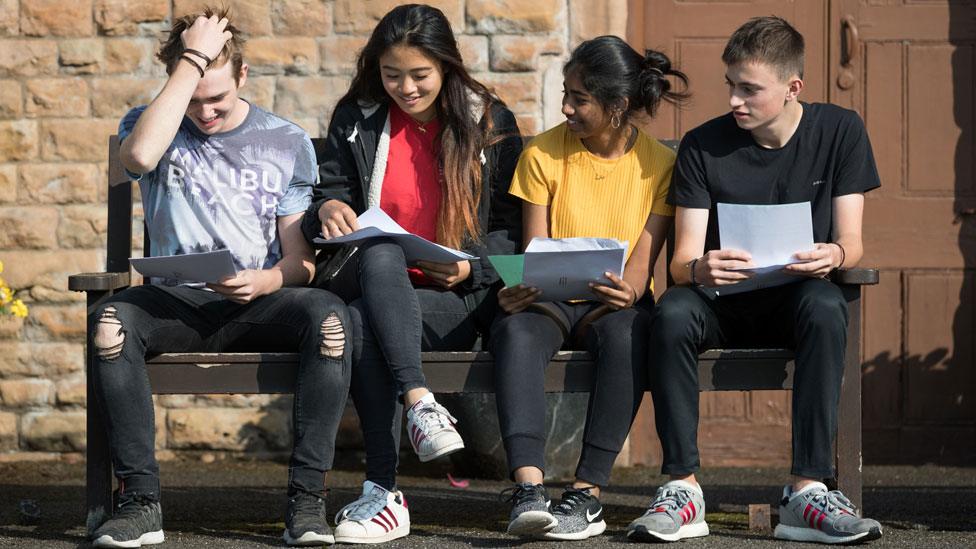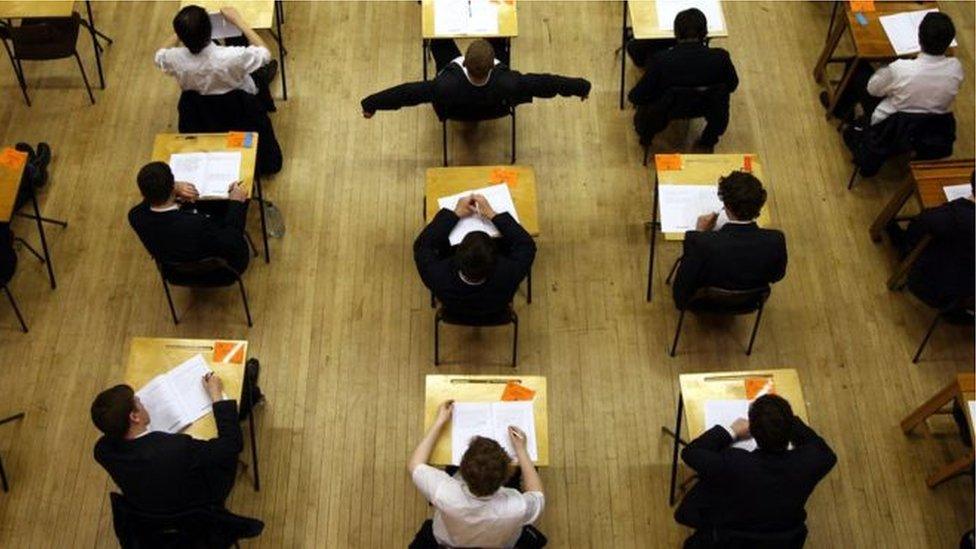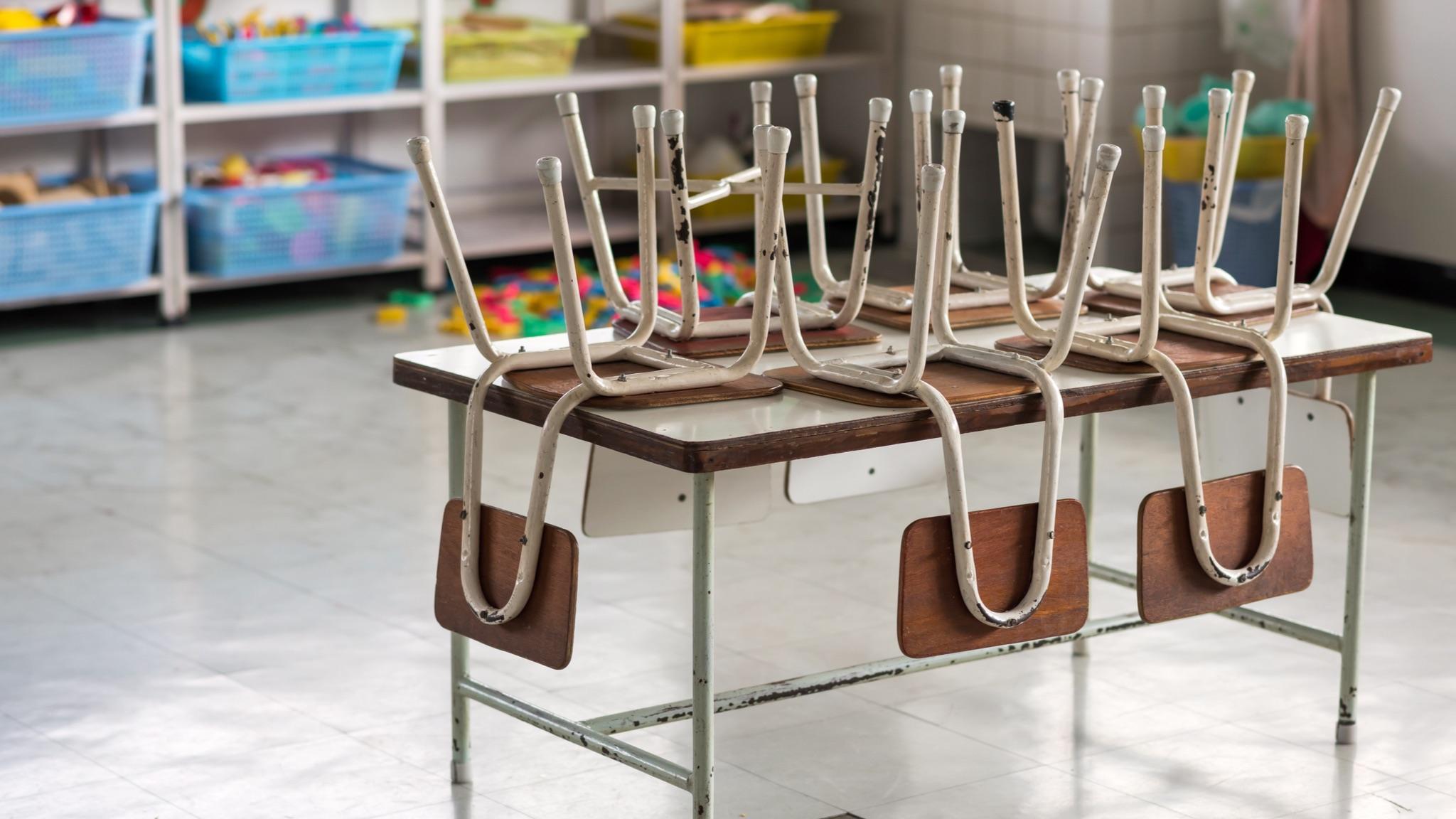Coronavirus: A-level predictions 'would see rise in NI top grades'
- Published
- comments

Teachers were asked to predict the grades they thought pupils would have achieved
Top grades at A-level would have risen in 2020 by at least 10% if data from schools alone had been used.
That is according to the head of the Council for Curriculum, Examinations and Assessment (CCEA), Justin Edwards.
CCEA has also said it will scrap fees for appeals against results this year.
As exams were cancelled due to the coronavirus pandemic, calculated grades will be used to give pupils their A-level and GCSE results.
Teachers were asked to predict the grades they thought pupils would have achieved had exams gone ahead using information including coursework, mock exams and homework.
Schools were also asked to rank pupils in each subject.
Schools then submitted that data to CCEA - Northern Ireland's exams board - who have standardised results to ensure that grades in 2020 are of equal value to those awarded in other years.
Working-class disadvantage?
CCEA said the process of standardisation involved applying statistical models to the data submitted by schools and using other available evidence.
Evidence included the average performance of schools and colleges in each subject over the past three years, and - for AS and A-level - pupils' previous results at GCSE or AS-level.
As a result, some pupils may get different grades from those predicted by their teachers.
CCEA's chief executive Justin Edwards said that over 232,000 predicted grades and subject rank orders had been submitted by schools.
There has been controversy over results in Scotland where pupils sit Higher exams rather than A-levels and have already received their results.
The country's exam body lowered about 125,000 estimated grades and there have been claims bright pupils from deprived areas were unfairly penalised.

A-level results will be provided on 13 August with GCSE results one week later on 20 August
Joel Keys, an A-level pupil at Breda Academy, told BBC News NI's The Nolan Show he did not trust working-class students "to be treated fairly" if a school's prior performance is used to determine their grades.
He also said homework and other considerations could disadvantage children from single-parent families.
Ellie Currie, a pupil at Portadown College, told the programme she was "scared" she would be negatively affected.
"My school generally does pretty well, however, it is still in a working-class area, so I'm very concerned that my grades are going to be lessened because I'm from a working-class area," she said.
'Majority unchanged'
Mr Edwards said the information schools had provided was the "baseline" for this year's results.
"This represented a collective effort, demonstrating the professional judgement, dedication and integrity of Northern Ireland's teaching profession," he said.
"In line with every year, standardisation is an essential part of the qualifications process to ensure that every student is treated fairly and that standards are aligned across schools and colleges."
"We now believe that without standardisation, CCEA A-level grades would have risen by at least 10 percentage points at A* to A grade boundary."
"Such a rise would have been considerably more than any previous year and would have undermined confidence in qualifications."
Mr Edwards said that meant moderation by CCEA had been essential, but the majority of results would be unchanged from those submitted by schools.
"Results for students will almost always be broadly in line with teachers' expectations, and the awarding process has been designed to allow leniency where this can be done without undermining fairness," he said.
Appeals from schools
Mr Edwards also said the standardisation process for results had been thoroughly checked and quality assured, and it was robust and the best solution in exceptional circumstances.
"This summer's grades will have the same value and recognition as those issued previously and in the future thus enabling every student to compete on a level playing field whatever they choose to do next," he said.
A-level results will be provided on 13 August with GCSE results one week later on 20 August.
The exam regulator Ofqual has said that A-level and GCSE results in England will be higher this summer.
Meanwhile, CCEA said it would not charge fees for appeals over results this year.
Fees can normally range from £8 - £36 to have individual results re-checked or re-marked.
However appeals will only be accepted from schools and colleges and not directly from pupils.
Though pupils will be able to ask their school to appeal on their behalf if they think CCEA has made an error in the process of awarding them their grade, they cannot appeal just because they are unhappy with the grade their teacher or school had predicted for them.
However, if a pupil feels they have evidence their teacher was biased against them in predicting grades they can ask their school to investigate.
- Published16 April 2020

- Published21 July 2020

- Published29 June 2020
